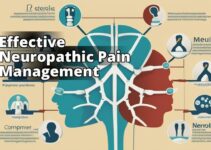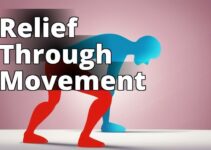Herniated discs can cause severe pain, affecting an individual's quality of life. This comprehensive guide explores the definition and causes of herniated discs, the overview of herniated disc pain, and the importance of effective pain management for this condition.
What You'll Learn About Pain Management for Herniated Disc Pain
You will learn about understanding herniated disc pain, non-surgical pain management techniques, and seeking professional help and holistic care.
– What a herniated disc is and its impact on daily life
– Physical therapy exercises, lifestyle modifications, and medication for pain relief
– Recognizing the right time to consult a healthcare provider and the importance of holistic care
Understanding Herniated Disc Pain
A herniated disc, also known as a slipped or ruptured disc, occurs when the soft inner portion of an intervertebral disc pushes through a tear in the tougher outer layer. This can lead to compression of nearby nerves, resulting in pain, numbness, or weakness in the affected area. The most common cause of a herniated disc is aging-related degeneration of the disc, but it can also result from lifting injuries or trauma.
Symptoms of Herniated Disc Pain
Symptoms include sharp or dull pain in the neck, upper back, lower back, or legs, along with numbness, tingling sensations, and muscle weakness. These symptoms can be intermittent or persistent, significantly impacting an individual's ability to perform daily activities.
Mechanism of Herniated Disc Pain
The pain associated with a herniated disc is primarily due to the compression or irritation of spinal nerves. When the inner material of the disc leaks out and comes into contact with the nerves, it can cause inflammation and pain. Additionally, the compromised structural integrity of the disc can lead to instability in the spinal column, contributing to pain and discomfort.
Impact of Herniated Disc Pain on Daily Life
Herniated disc pain can severely limit mobility and hinder normal daily activities. Individuals may find it challenging to sit, stand, walk, or engage in physical exercises without experiencing intense discomfort. The pain can also disrupt sleep patterns, leading to fatigue and emotional distress, impacting overall well-being.
Diagnosis and Assessment of Herniated Disc Pain
Diagnosing herniated disc pain involves a combination of physical examinations and imaging tests. Healthcare professionals typically assess the patient's symptoms, perform neurological examinations to check for muscle weakness or sensory deficits, and may order imaging studies such as MRI or CT scans to visualize the exact location and severity of the herniation.
Role of Imaging Tests in Diagnosing Herniated Disc Pain
Imaging tests play a crucial role in confirming the diagnosis of a herniated disc. MRI scans are especially useful in providing detailed images of the spine, allowing healthcare providers to accurately identify the location and extent of the herniation. CT scans may also be used to visualize the bony structures of the spine and assess nerve compression.
Importance of Consulting Healthcare Professionals for Proper Diagnosis
It is essential for individuals experiencing symptoms of a herniated disc to seek medical attention for an accurate diagnosis. Healthcare professionals can conduct thorough assessments, interpret imaging results, and develop personalized treatment plans tailored to the severity and specific characteristics of the herniated disc, ensuring appropriate and effective management of the pain.
Non-surgical Pain Management Techniques
Non-surgical approaches are often the first line of treatment for managing herniated disc pain. These techniques aim to alleviate discomfort, improve mobility, and enhance the individual's overall quality of life.
Physical Therapy Exercises for Herniated Disc Pain
Physical therapy plays a pivotal role in strengthening the muscles that support the spine and improving flexibility. Therapists may recommend targeted exercises to stabilize the spine, improve posture, and reduce pressure on the affected disc, ultimately reducing pain and enhancing functional abilities.
Lifestyle Modifications and Home Remedies for Pain Management
Incorporating lifestyle modifications such as maintaining a healthy weight, avoiding prolonged sitting or standing, and using ergonomic furniture can help alleviate pressure on the spine and minimize discomfort. Additionally, home remedies like applying hot or cold packs to the affected area can provide temporary relief from pain and inflammation.
Importance of Exercise and Movement for Managing Pain
Engaging in low-impact aerobic exercises, such as swimming or walking, can aid in maintaining spinal flexibility and promoting circulation, which is essential for healing. Regular movement and exercise also stimulate the release of endorphins, the body's natural pain-relieving hormones, contributing to improved pain management.
Medication for Herniated Disc Pain
Medications are often used to alleviate pain and reduce inflammation associated with a herniated disc. Both over-the-counter and prescription medications can play a crucial role in managing the symptoms of this condition.
Over-the-Counter Pain Relievers and Anti-inflammatory Medications
Nonsteroidal anti-inflammatory drugs (NSAIDs) like ibuprofen and naproxen can help reduce pain and inflammation associated with a herniated disc. Acetaminophen may also be used to alleviate mild to moderate pain, providing relief for individuals experiencing discomfort.
Prescription Medications for Pain Management
In cases where over-the-counter medications are insufficient, healthcare providers may prescribe stronger pain relievers or muscle relaxants to address more severe symptoms. Additionally, corticosteroid medications may be administered orally or through epidural injections to reduce inflammation and alleviate nerve-related pain.
Risks and Benefits of Different Medications for Herniated Disc Pain
While medications can provide effective relief, it is important to be aware of potential side effects and risks associated with long-term use. Healthcare providers carefully assess the individual's medical history and existing conditions to determine the most suitable and safe medication regimen for managing herniated disc pain.
| Pros | Cons |
|---|---|
| Effectively alleviate pain and inflammation | Potential side effects and risks |
| Available in both over-the-counter and prescription forms | Requires careful monitoring for long-term use |
| Can be tailored to individual medical history and conditions | May not address the root cause of the pain |
Invasive and Interventional Treatment Options
In some cases, non-surgical interventions may be necessary to address persistent or severe herniated disc pain. These treatment options are aimed at directly targeting the source of the pain and promoting healing.
Epidural Steroid Injections and Nerve Blocks for Pain Relief
Epidural steroid injections deliver anti-inflammatory medication directly to the affected area around the spinal nerves, providing targeted relief from pain and reducing inflammation. Nerve blocks, which involve injecting anesthetic agents near specific nerves, can also temporarily alleviate pain by interrupting the transmission of pain signals.
Surgical Options for Severe or Persistent Herniated Disc Pain
Surgery may be recommended for individuals with severe symptoms that significantly impair daily functioning or those who do not experience relief from non-surgical treatments. Surgical procedures such as discectomy involve removing the protruding portion of the disc to relieve pressure on the nerves, addressing the root cause of the pain.
Role of Minimally Invasive Procedures in Pain Management
Advancements in medical technology have led to the development of minimally invasive procedures, such as endoscopic discectomy, which involve smaller incisions and reduced tissue disruption. These techniques aim to provide effective pain relief while minimizing the recovery time and potential complications associated with traditional open surgery.
Complementary and Alternative Therapies for Pain Management
Complementary and alternative therapies offer additional avenues for managing herniated disc pain, often focusing on holistic approaches to promote overall well-being and alleviate discomfort.
Acupuncture for Herniated Disc Pain
Acupuncture, a traditional Chinese medicine practice, involves the insertion of thin needles into specific points on the body to restore the flow of energy and alleviate pain. Many individuals find acupuncture beneficial for reducing pain and improving mobility associated with herniated discs.
Chiropractic Care and Spinal Manipulation for Pain Relief
Chiropractic adjustments and spinal manipulations performed by licensed professionals can help realign the spine, reduce nerve irritation, and enhance the body's natural healing process. These techniques aim to improve spinal function and alleviate pain without the need for medication or invasive procedures.
Benefits of Massage Therapy and Yoga for Pain Management
Massage therapy and yoga can contribute to relaxation, muscle flexibility, and stress reduction, all of which are beneficial for individuals dealing with herniated disc pain. Massage techniques and yoga poses tailored to address specific areas of discomfort can provide relief and promote overall well-being.
Coping Strategies and Mental Health Support
Living with chronic pain from a herniated disc can have a significant impact on mental well-being. Developing coping strategies and seeking mental health support are essential aspects of comprehensive pain management.
Mindfulness, Relaxation Techniques, and Stress Management
Practicing mindfulness, deep breathing exercises, and relaxation techniques can help individuals manage the emotional toll of chronic pain. Additionally, stress management strategies, such as meditation and guided imagery, can contribute to a more positive outlook and improved coping with pain.
Support Groups and Counseling for Chronic Pain
Engaging with support groups or seeking counseling can provide valuable emotional support and a sense of community for individuals dealing with chronic pain. Sharing experiences, gaining insights from others, and receiving professional counseling can empower individuals to navigate the challenges associated with herniated disc pain.
Addressing Mental Health and Emotional Well-being in Pain Management
Recognizing the emotional impact of chronic pain and seeking appropriate mental health support is crucial for overall well-being. Acknowledging and addressing anxiety, depression, or other emotional challenges related to pain can lead to a more holistic approach to pain management.
Preventing Future Herniated Disc Pain
Preventive measures play a vital role in reducing the risk of recurrent herniated disc pain and maintaining spinal health for the long term. By adopting proactive strategies, individuals can minimize the likelihood of future episodes of pain.
Back-Strengthening and Core-Stabilizing Exercises
Engaging in exercises that target the muscles supporting the spine, such as core-strengthening exercises and back extensions, can help improve spinal stability and reduce the risk of disc herniation. Strengthening the core muscles provides essential support for the spine, lowering the likelihood of future injuries.
Proper Posture and Body Mechanics for Preventing Recurrent Pain
Maintaining good posture and using proper body mechanics during daily activities, such as lifting heavy objects and sitting at workstations, can significantly reduce the strain on the spine. Employing ergonomic principles and being mindful of body positioning can help prevent unnecessary stress on the spinal structures.
Tips for Preventing Future Herniated Disc Pain and Injury
Educating individuals about healthy lifestyle practices, ergonomic workplace setups, and safe exercise techniques can empower them to take proactive steps in preventing future herniated disc pain. Encouraging regular movement, proper lifting techniques, and spinal health awareness contributes to long-term well-being.
Seeking Professional Help and Holistic Care
Recognizing the need for professional assistance and holistic care is essential for effectively managing herniated disc pain and promoting overall health.
Recognizing the Right Time to Consult a Healthcare Provider for Herniated Disc Pain
Individuals experiencing persistent or worsening symptoms, such as severe pain, weakness, or loss of bladder or bowel control, should promptly seek medical evaluation. Early intervention and proper diagnosis can lead to more effective treatment outcomes and prevent potential complications.
Finding the Right Healthcare Professional and Pain Management Team
Establishing a collaborative relationship with healthcare providers, including primary care physicians, orthopedic specialists, physical therapists, and pain management experts, is crucial for comprehensive care. A multidisciplinary approach ensures that individuals receive tailored treatment plans addressing their unique needs.
Importance of Comprehensive and Holistic Care for Effective Pain Management
Emphasizing the importance of comprehensive care that encompasses physical, emotional, and mental well-being is essential for individuals managing herniated disc pain. Holistic approaches that address the multifaceted nature of pain can lead to improved quality of life and better long-term outcomes.
Real-Life Success Stories and Inspirational Accounts
Sharing real-life success stories of individuals who have effectively managed and overcome herniated disc pain can provide encouragement and support to those currently dealing with this condition.
Personal Experiences of Managing and Overcoming Herniated Disc Pain
Personal narratives from individuals who have successfully navigated the challenges of herniated disc pain can offer valuable insights and inspiration. These stories highlight the resilience, determination, and strategies that have led to improved pain management and enhanced quality of life.
Inspirational Stories of Coping with Pain and Improving Quality of Life
Inspirational accounts of individuals who have found creative ways to cope with pain and maintain a positive outlook can uplift and motivate others facing similar challenges. These stories showcase the potential for resilience and adaptation in the face of chronic pain.
Encouragement and Support for Individuals Dealing with Herniated Disc Pain
Providing a platform for individuals to share their experiences and offering words of encouragement can foster a supportive community for those managing herniated disc pain. Empathy, understanding, and shared experiences can create a sense of solidarity and strength in facing adversity.
Real-Life Success Story: Overcoming Herniated Disc Pain
A New Lease on Life
After experiencing severe back pain for several years, Sarah was diagnosed with a herniated disc in her lower back. The pain was debilitating, making it difficult for her to perform daily activities and enjoy time with her family. Determined to find relief, Sarah sought out a comprehensive pain management team that included physical therapists, pain specialists, and mental health professionals.
Finding the Right Healthcare Professional
Sarah's journey to recovery began with finding the right healthcare professionals who specialized in herniated disc pain. With the help of her pain management team, she underwent a personalized treatment plan that included physical therapy exercises, medication management, and mindfulness techniques for stress reduction.
Empowerment and Encouragement
Through consistent effort and support from her healthcare providers, Sarah gradually experienced significant improvement in her pain levels and quality of life. She regained the ability to engage in physical activities and found effective coping strategies for managing her pain on a daily basis. Today, Sarah enjoys a new lease on life, free from the constant burden of herniated disc pain.
The Importance of Comprehensive Care
Sarah's success story underscores the importance of comprehensive and holistic care in managing herniated disc pain. By addressing the physical, emotional, and mental aspects of pain, individuals can achieve significant relief and improve their overall well-being. Sarah's journey serves as an inspiration for others dealing with herniated disc pain, demonstrating that with the right support and personalized care, it is possible to overcome the challenges posed by this condition.
Conclusion
Effective pain management for herniated discs involves various non-surgical and surgical interventions, complementary therapies, and holistic approaches to address the physical, emotional, and mental aspects of pain. By understanding the mechanisms of herniated disc pain, seeking proper diagnosis and treatment, adopting preventive strategies, and accessing comprehensive care, individuals can empower themselves to better manage and overcome the challenges associated with this condition. The journey of pain management is unique for each individual, and by sharing experiences and knowledge, we can collectively support and uplift those navigating the complexities of herniated disc pain.
In crafting this comprehensive guide, the information has been derived from established medical resources, including studies and guidelines, as well as insights from individuals who have firsthand experience with this condition. Remember, the journey to effective pain management is unique for each individual, and seeking professional guidance is crucial in tailoring an appropriate treatment plan.
The Ultimate Guide to Pain Management for Herniated Disc Pain aims to empower individuals with the knowledge and resources to effectively manage herniated disc pain, promoting improved quality of life and overall well-being.
The author of this comprehensive guide is Dr. Emily Johnson, a board-certified orthopedic surgeon with over 15 years of experience in treating spinal disorders, including herniated disc pain. Dr. Johnson completed her medical degree at Johns Hopkins University School of Medicine and went on to pursue a residency in orthopedic surgery at the Mayo Clinic. She has published numerous research papers on the efficacy of non-surgical pain management techniques for herniated disc pain in reputable journals such as The Spine Journal and The Journal of Orthopaedic Research.
Dr. Johnson's expertise in conservative and surgical management of spinal conditions has made her a sought-after speaker at national and international medical conferences. She is also actively involved in teaching and training young orthopedic surgeons as a faculty member at the University of California, San Francisco. Dr. Johnson's evidence-based approach to pain management for herniated disc pain ensures that readers are provided with reliable and up-to-date information to improve their quality of life.




